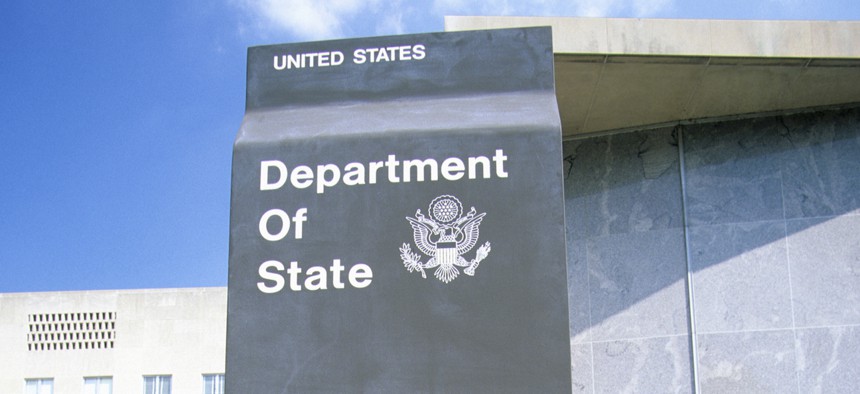
At a hearing earlier this month, Secretary Blinken pledged to work with lawmakers to get them what they needed without violating a “cherished” tradition that “goes back decades.” Hisham Ibrahim/Getty Images
State, Union Say Complying With House Subpoena Would Create Chilling Effect on Career Staff
The department said turning over a protected communication on the Afghanistan withdrawal would undermine its "unique way" for employees to "speak truth to power."
The State Department is not backing down from its commitment to protect the “dissent channel” established for its career diplomats, telling lawmakers that complying with their subpoena would violate the trust the agency has established with its workforce.
The union that represents career Foreign Service officers applauded State’s decision on Thursday, warning that betraying that trust would make employees think twice before conveying their honest professional opinions. Rep. Michael McCaul, R-Texas, chairman of the House Foreign Affairs Committee, earlier this week issued the subpoena for the dissent channel cable written by State employees in July 2021 allegedly warning of potential governmental collapse in Afghanistan.
McCaul, whose committee is investigating the U.S. withdrawal from Afghanistan and the ensuing chaos in the country, said he made “multiple good faith efforts” to work with State prior to issuing the subpoena, but Secretary Athony Blinken’s refusal to turn it over forced him to issue his first mandate as chairman.
“The American people deserve answers as to how this tragedy unfolded, and why 13 U.S. servicemembers lost their lives,” McCaul said, referring to the deadly explosion that took place in Kabul in the final days before American troops wrapped up their evacuation efforts. “We expect the State Department to follow the law and comply with this subpoena in good faith.”
In a briefing on Thursday, Vedant Patel, a State spokesperson, said the dissent channel depended on a certain degree of secrecy.
It is a “forum that was established in order to ensure that employees can share their candid and critical advice with department leadership,” Patel said. “We made clear and followed up with the committee to reiterate our willingness to provide a briefing about the concerns raised and the challenges identified by Embassy Kabul, including in the dissent channel. The committee instead chose to issue a subpoena.”
At a hearing earlier this month, Blinken pledged to work with lawmakers to get them what they needed without violating a “cherished” tradition that “goes back decades.”
"By our regulations, these cables may only be shared with senior officials in the department," Blinken said. "Again, that's to protect the integrity of the process to make sure we don't have a chilling effect on those who might want to come forward, knowing that they will have their identities protected and that they can do so without fear or favor."
Blinken said he reads every dissent cable he receives, calling the process a “unique way for anyone in the department to speak truth to power as they see it without fear or favor.”
Eric Rubin, president of the American Foreign Service Association, said the government can only foster useful dissent among its employees when the exchange is "confined to internal discussion within the executive branch."
“Failure to protect the confidentiality of constructive dissent can lead to a fear of disclosure or retaliation that may dissuade career employees from offering their best professional advice,” Rubin said. “In this regard, AFSA believes that use of the dissent channel, which AFSA has strongly supported over the decades, must be protected within the executive branch of government.”
Patel said State is committed to ensuring Congress can conduct oversight, is still willing to provide a briefing on the contents of the cable in question and has provided “thousands of pages of documents” for the Afghanistan investigation. Assisting the committee and protecting its workforce is not mutually exclusive, he added.
“The department’s concern is much broader than this cable or any single cable,” Patel said. “Rather, it’s to protect all dissent channel communications past and future to ensure that the channel remains a privileged and confidential vehicle for department personnel or embassy staff to share their candid feedback and advice.”
McCaul rejected that logic, saying there was no legal argument to support it. He added that State cited a precedent of protecting a dissenting view issued by a former career diplomat, Thomas Boyatt, in the 1970s. Boyatt provided a statement to the committee, however, said his memorandum never should have been protected and congressional oversight “enables us to learn from inevitable mistakes.”







